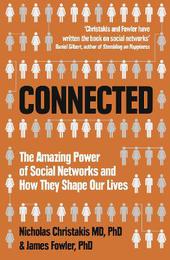
|
Connected: The Amazing Power of Social Networks and How They Shape Our Lives
Paperback / softback
Main Details
| Title |
Connected: The Amazing Power of Social Networks and How They Shape Our Lives
|
| Authors and Contributors |
By (author) Nicholas Christakis
|
|
By (author) James Fowler
|
| Physical Properties |
| Format:Paperback / softback | | Pages:352 | | Dimensions(mm): Height 198,Width 129 |
|
| Category/Genre | Popular psychology |
|---|
| ISBN/Barcode |
9780007303601
|
| Classifications | Dewey:302.3 |
|---|
| Audience | |
|---|
|
Publishing Details |
| Publisher |
HarperCollins Publishers
|
| Imprint |
HarperPress
|
| Publication Date |
20 January 2011 |
| Publication Country |
United Kingdom
|
Description
Is happiness catching? Are your friends making you fat? Can your sibling make you smart? Is wealth contagious? Where is true love found? Does free will exist? Based on exciting discoveries in mathematics, genetics, psychology and sociology, 'Connected' is an innovative and fascinating exploration of how social networks operate. Think it's all about who you know? It is. But not the way you think. Turns out your colleague's husband's sister can make you fat, even if you don't know her. And a happy friend is more relevant to your happiness than a bigger income. Our connections - our friends, their friends, and even their friends' friends - have an astonishing power to influence everything from what we eat to who we sleep with. And we, in turn, influence others. Our actions can change the behaviours, the beliefs, and even the basic health of people we've never met. In this brilliantly original and effortlessly engaging exploration of how much we truly influence one another. Pre-eminent social scientists Nicholas Christakis and James Fowler explain why obesity is contagious, why the rich get richer, even how we find and choose our partners. Intriguing and entertaining, with revelatory implications for everything from our notion of the individual to ideas about public health initiatives, 'Connected' will change the way you think about every aspect of your life, and how you live it.
Author Biography
Nicholas A. Christakis, MD, PhD, is both a physician and a social scientist. Medicine and social science are like distant cousins who meet from time to time, see that they have much in common, and then get into an argument. Christakis has been trying to referee these arguments for years, sometimes with surprising success. He is a professor of medical sociology in the Department of Health Care Policy at Harvard Medical School, professor of sociology in the Department of Sociology in the Harvard Faculty of Arts and Sciences, and professor of medicine and an attending physician in the Department of Medicine at Harvard Medical School. He was elected to the Institute of Medicine of the National Academy of Sciences in 2006. After finishing his clinical training in internal medicine, he combined his research with clinical practice as a hospice physician, looking for ways to improve end-of-life care. Since 1999, he has been investigating how social factors and social interactions affect health and longevity. Christakis is best known for his studies on how social networks form and operate. When he is not in the lab, he teaches students in many parts of Harvard University and in Harvard-affiliated hospitals, and is regularly voted a 'favorite professor' by Harvard undergraduates because of his engaging lecture style and open office hours. He was named to Time magazine's list of the 100 most influential people in the world in 2009.
Reviews'In the category...of works of brilliant originality that stimulate and enlighten and can sometimes even change the way we understand the world' New York Times Review of Books 'An illuminating account of the pervasive and often bizarre qualities of social networks...We like to think we are largely in control of our day-to-day lives, yet most of what we do, and even the way we feel, is significantly influenced by those around us - and those around them, and those around them....The authors excel at drawing out the devil in the detail: their explanations of how the architecture of networks dictates their dynamics are compelling....profound' Michael Bond, New Scientist
|